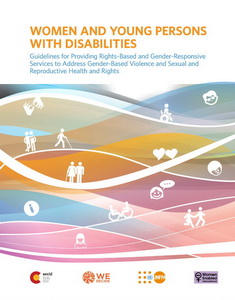 The United Nations Population Fund (UNFPA), in cooperation with the international organization Women Enabled International, developed a useful resource for all service providers in the field of protection from gender-based violence and of sexual and reproductive health and rights of women and youth with disabilities. This resource has been published in the English language as a publication in November 2018, titled: “Guidelines for Providing Rights-Based and Gender-Responsive Services to Address Gender-Based Violence and Sexual and Reproductive Health and Rights for Women and Young Persons with Disabilities”.
The United Nations Population Fund (UNFPA), in cooperation with the international organization Women Enabled International, developed a useful resource for all service providers in the field of protection from gender-based violence and of sexual and reproductive health and rights of women and youth with disabilities. This resource has been published in the English language as a publication in November 2018, titled: “Guidelines for Providing Rights-Based and Gender-Responsive Services to Address Gender-Based Violence and Sexual and Reproductive Health and Rights for Women and Young Persons with Disabilities”.
The guidelines are primarily intended for service providers working in protection from gender-based violence and sexual and reproductive health and rights, and are also a valuable resource for all stakeholders — including those in government, international organizations, and non-governmental organizations — involved in designing, developing, implementing or advocating for services dealing with the issues of gender-based violence or sexual and reproductive health and rights of women and young persons with disabilities.
The basic services for victims of gender-based violence include: healthcare services (e.g. examination of sexual abuse and care, assessment and care for mental health), judiciary and police services (e.g. assessment and examination, offender liability, safety and protection), social welfare services (e.g. crisis counselling; helplines; legal counselling and representation; psychosocial support and counselling), and coordination at the national and local level.
The basic services in the field of sexual and reproductive health and rights of women and young persons – with or without disabilities – include: comprehensive sexual education; information, means and services for an entire range of modern contraceptive methods; healthcare for mothers and newborns (including prenatal care, professional care during birth, emergency obstetric care, care after childbirth, and newborn care); prevention, diagnosis, and treatment of sexual and reproductive health issues (e.g. sexually transmitted infections, including HIV, syphilis, and HPV, cancer of the reproductive organs and breast cancer, and infertility); safe and accessible abortions where they are not illegal; and care after a miscarriage and treatment of complications due to unsafe abortions.
Women and young persons with disabilities often do not receive these necessary services. The prevention of gender-based violence and services are often inaccessible to women and youth with disabilities. Service providers regularly show a lack of knowledge, sensitivity and expertise regarding the treatment of women and youth with disabilities, resulting in a failure to identify women and young persons with disabilities that have had an experience or are experiencing gender-based violence, and to provide them with basic services.
Because of all of the above these kinds of resources are welcome for all those working on gender-based violence and sexual and reproductive health and rights of women and youth with disabilities.
Source: portaloinvalidnosti.net
 Government of the Republic of Serbia
Government of the Republic of Serbia















 pdf [271 KB]
pdf [271 KB]
Leave a Comment